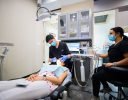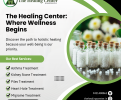Advantage of Seeing a Vein Specialist: What Kind of Doctor is a Vein Specialist?

Vein health is crucial for maintaining overall wellness, as veins carry blood back to the heart, ensuring proper circulation. However, vein disorders can arise due to factors like age, genetics, lifestyle, and prolonged inactivity, affecting many people. When vein-related issues occur, they are best managed by a medical professional known as a vein specialist. But what kind of doctor is a vein specialist, and what advantages do they bring to your health? Let’s explore the benefits of seeing a vein specialist and what they offer in terms of vein health expertise.
What is a Vein Specialist?
A vein specialist is a medical doctor trained specifically to diagnose and treat disorders in veins. These doctors have expertise in managing venous diseases such as varicose veins, spider veins, chronic venous insufficiency, deep vein thrombosis (DVT), and other vein-related conditions. They use advanced technology to assess and address vein health, offering minimally invasive treatments and patient-focused care.
Vein specialists come from different medical backgrounds, including vascular surgery, interventional radiology, and sometimes dermatology. The advantage of seeing a vein specialist lies in their comprehensive understanding of venous systems, allowing them to provide targeted solutions for complex vein issues.
Advantages of Seeing a Vein Specialist for Venous Health
Seeing a vein specialist offers numerous advantages, especially for those with specific venous health needs. Here are the key benefits:
Accurate Diagnosis and Specialized Knowledge
One of the major benefits of consulting a vein specialist is their in-depth understanding of vein-specific conditions. General practitioners may identify symptoms of vein diseases but may lack the specialized knowledge to diagnose and treat them thoroughly. A vein specialist can perform detailed diagnostic tests, including Doppler ultrasound and other imaging techniques, to identify the exact issue. This precise diagnosis is essential for effective treatment and long-term management of venous disorders.
Customized Treatment Plans
Vein health varies widely from person to person. A vein specialist understands this complexity and customizes treatment plans to meet the unique needs of each patient. Depending on the type and severity of the vein issue, they may recommend lifestyle changes, compression stockings, or minimally invasive procedures like sclerotherapy, endovenous laser treatment (EVLT), or radiofrequency ablation. This customized approach maximizes results and minimizes recovery time, providing patients with a treatment plan that aligns with their personal health goals.
Minimally Invasive Treatment Options
Advances in medical technology have led to the development of minimally invasive procedures that provide effective results with minimal discomfort. Vein specialists are skilled in these advanced methods, which typically require only local anesthesia, resulting in shorter recovery periods and less post-procedure discomfort. Treatments like EVLT and sclerotherapy can be completed within an hour, allowing patients to resume their normal activities quickly. By choosing a vein specialist, patients benefit from these convenient, safe, and effective treatment options.
Prevention of Future Complications
Ignoring vein problems can lead to serious complications, including skin ulcers, blood clots, and chronic venous insufficiency. Regular check-ups with a vein specialist help prevent these issues by addressing early signs of venous disease before they worsen. A vein specialist can also provide lifestyle advice on managing risk factors, which is crucial for individuals prone to venous problems. Through proactive management and preventive care, a vein specialist helps patients maintain optimal vein health over the long term.
Different Types of Doctors Who Act as Vein Specialists
Several medical specialties focus on vein health, each with unique strengths. Here are the main types of doctors who often work as vein specialists:
Vascular Surgeons
Vascular surgeons are highly trained to treat diseases of the vascular system, including arteries and veins. They undergo extensive education in diagnosing and treating complex vascular conditions, including venous diseases. Vascular surgeons often handle cases that require surgical intervention, such as severe varicose veins or blockages in major veins. While they are capable of performing non-surgical treatments, they are particularly valuable when surgery is the only viable option.
Interventional Radiologists
Interventional radiologists specialize in using imaging technology to guide minimally invasive procedures. They have extensive training in treating vein issues like varicose veins and DVT with techniques such as catheter-directed thrombolysis, sclerotherapy, and radiofrequency ablation. Patients benefit from interventional radiologists’ expertise in using imaging for accurate diagnosis and precision treatment, particularly when minimally invasive procedures are preferred.
Phlebologists
Phlebologists focus exclusively on the treatment of venous diseases. Though not a recognized medical specialty, phlebologists are often certified doctors who concentrate on vein health, providing treatments for issues such as spider veins, varicose veins, and venous insufficiency. They are generally trained to perform non-invasive and minimally invasive treatments, making them a good choice for patients seeking aesthetic improvements or early-stage vein treatments.
Dermatologists with Vein Specialization
Some dermatologists undergo additional training to treat vein issues, especially those that appear close to the skin, like spider veins. They usually offer cosmetic vein treatments, using procedures like sclerotherapy and laser therapy to improve the appearance of visible veins. Dermatologists may not address deeper venous issues but are skilled in managing cosmetic concerns and minor venous conditions.
Signs That You Need to See a Vein Specialist
While not every vein issue requires immediate treatment, certain symptoms suggest the need for a vein specialist. Signs to watch for include:
- Visible Varicose or Spider Veins: Enlarged, twisted veins, particularly in the legs, often indicate venous issues that may require treatment.
- Swelling or Pain in the Legs: Persistent pain, aching, or swelling in the legs could be a sign of venous insufficiency or deep vein thrombosis.
- Skin Discoloration and Ulcers: Darkened skin, especially around the ankles, along with non-healing sores, indicates advanced venous disease.
- Restlessness or Heaviness in the Legs: If you frequently experience heaviness or restlessness in your legs, especially after standing for extended periods, it may be due to vein health issues.
If you experience any of these symptoms, seeing a vein specialist can lead to a proper diagnosis and effective treatment plan.
What to Expect During a Visit to a Vein Specialist
When you visit a vein specialist, the process usually begins with a thorough evaluation. Here’s what you can expect:
Initial Consultation and Medical History
The vein specialist will discuss your symptoms, medical history, and any risk factors that may contribute to vein issues. They’ll want to know about lifestyle factors, family history, and any previous venous treatments.
Diagnostic Testing
Diagnostic imaging tests, like a Doppler ultrasound, are often performed to get a clear view of your veins’ health. This test helps the specialist see blood flow and detect any blockages, allowing for a more accurate diagnosis.
Treatment Recommendations
Based on your diagnosis, the vein specialist will discuss your treatment options, covering both lifestyle changes and medical treatments. You’ll receive detailed information on each option’s benefits, risks, and expected recovery time, allowing you to make an informed decision.
Conclusion
In summary, the advantage of consulting a vein specialist lies in their expertise in vein health, ability to provide accurate diagnoses, and access to advanced, minimally invasive treatments. Whether you see a vascular surgeon, interventional radiologist, phlebologist, or dermatologist specializing in veins, each type of doctor offers unique benefits depending on your vein health needs. If you experience symptoms of vein disease or want to prevent future issues, seeking out a vein specialist can help you maintain healthier veins and improve your overall quality of life.
YOU MIGHT ALSO LIKE
ABOUT ME

Welcome to my blog Artcle slurp. We share latest article for all niche. If you want to publish your article then mail me on articleslurpblog@gmail.com
































